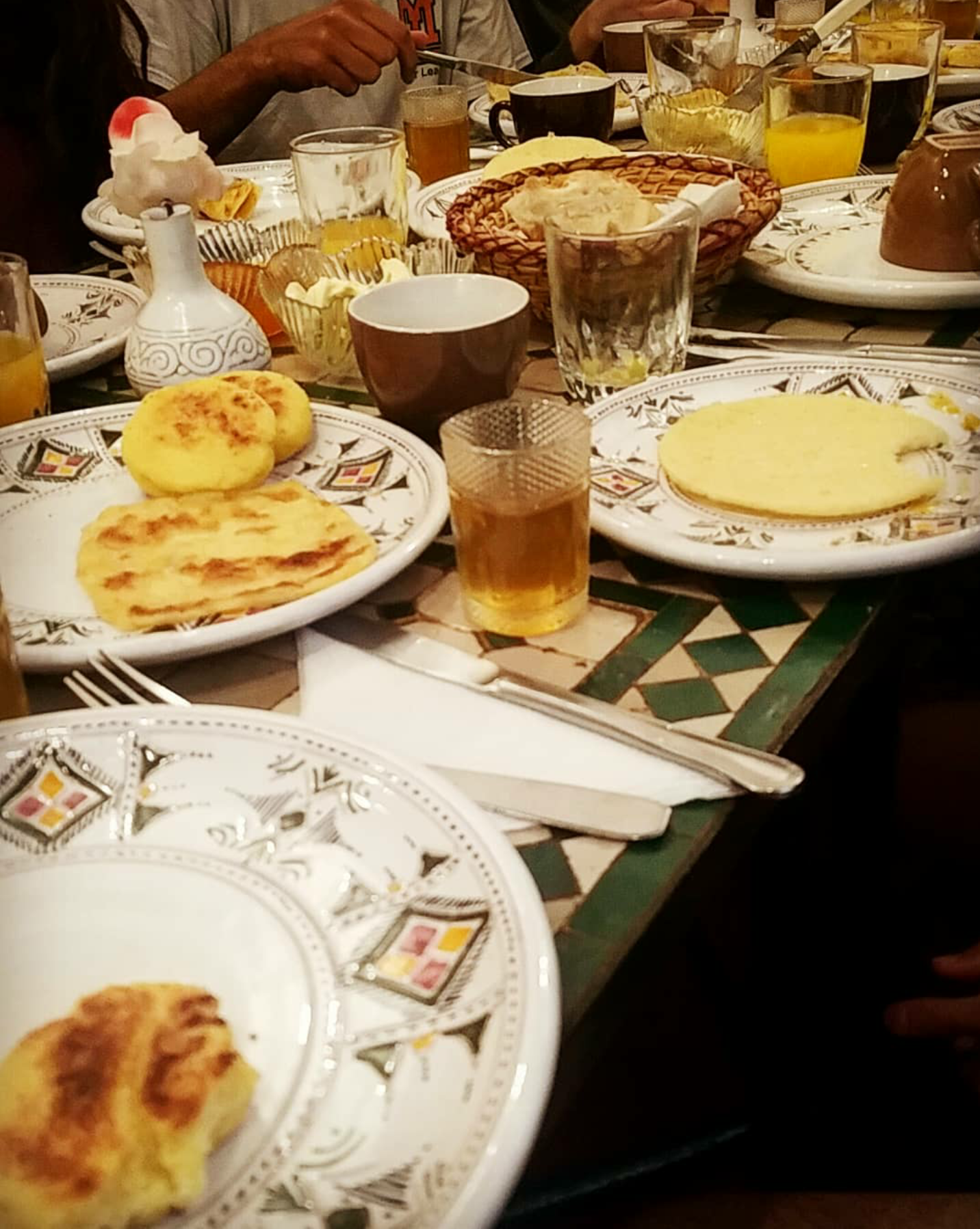
By Allison Chen
[divider]
Yeasty, warm air wafted toward our groggy faces, as my roommate and I walked toward the dining table. We caught the faces of our equally jet-lagged travel companions, already seated with hands outstretched toward the food. Sprawled along the table, bowls and bowls of bread filled the space. Now, the breads had variety: sliced-baguette-types, flimsy tortilla-shaped pieces, hard and dense circular carbs, and pound cakes galore. In fact, the only food for breakfast was bread, served alongside the traditional Moroccan mint tea and orange juice.
A truly all-carb breakfast, I mentally compared my meal to my usual breakfasts and the breakfasts I’ve enjoyed in multiple foreign countries. Though I was used to either bite-sized granola breakfasts or morning meals of meat, fruit, and carbs, I quite enjoyed this breakfast of just bread. We dipped our fingers in the pound-cake plate, grabbed some more slices of dry bread, swigged our tea, marveling at the amount of carbs we consumed.
However, bread was far from a mere breakfast staple.
The restaurant service in Morocco can, at times, feel exponentially slower than the fast-paced restaurant culture of America. However, from fast-food Moroccan diners to fancy, three-course-meal restaurants, waiters routinely served baskets of bread after taking our orders.
In fact, lack of free bread before a meal was rare. The bread was never the same—sometimes, waiters brought baskets of standard, plain khobz, sold in every Moroccan street market; sometimes, they presented soft, chewy batbout with an unknown dressing daintily served alongside the basket. Moroccan cuisine took the idea of “breaking bread” seriously with each meal. Rarely did I see lunches advertised as “grab-and-go.” People shared meals to talk and bond in Morocco; meals became hours-long endeavors—a drastic contrast from the Soylent-or-desk-meal culture of American lunches.
One night, as we enjoyed the night air of the Jemaa El-Fna Square in a Marrakesh roof-top restaurant, we pored over the sticky menus to order in time for iftar—the breaking of fast during Ramadan. The time read 7:03 pm already—iftar was scheduled at 7:24 pm that day—so we quickly made our decisions, closing our menus to signal we were ready. 15 minutes passed, yet nobody came so one of us decidedly walked over to an idling waiter to take our orders.
With ten of us seated around the long table, three conversations ran at the same time—divided between the middle, left end, and right end, while those in between sections simultaneously kept up multiple conversations. Soon, the waiter brought those now-familiar baskets of bread as we joked about who we would share towels with, analyzed our favorite Eddie Redmayne movies, or raved about our favorite spots in Morocco thus far. I tore off a chunk of khobz, then Daud tore off another bit from the same piece of khobz, Alex—on my left—taking yet another lump.
Sure, the juice and milkshakes came relatively soon, but the first tagine did not arrive until much later. No matter—we had bread to take the edge off and fruit juice to sip, as our conversations grew, turned, and changed participants.
The bread that sustains the waiting period pushes us to savor our time together. The extended serving time and the meandering nature of our meals encourages us to talk, laugh, and share stories of our day together over food. Calling back to the earliest traditions of mankind where food was not only physical sustenance but also spiritual sustenance for community bonding, the meal traditions involving bread demonstrates a critical Moroccan value of family and community. Like the sonorous prayer calls that unite cities’ Muslim communities to pray or the taxi drivers that stop in the road to help another taxi driver with change, the role of bread in Moroccan meals contributes to the overarching culture of brotherhood and sharing.
On our last night in Marrakech, as we revisited our favorite café in the square, we looked forward to the long wait times, the bread and the butter, the last conversations with one another.
[hr]
Allison is a rising sophomore. You can contact her at allison.chen@yale.edu.